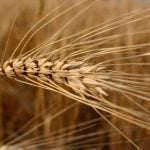Canada’s first durum variety classified as resistant to ergot may expand the wheat’s acreage in parts of Western Canada where it’s not been typically grown.


Unveiled at Ag in Motion, Canada’s first durum variety classified as resistant to ergot may expand the wheat’s acreage in parts of the Prairies where it’s not been typically grown

Practical Research: Growing it in soils with adequate levels of available copper is one way to go

Practical Research: The solution to the problem for wheat, barley and oat growers is very well documented

In the story of ergot in wheat, barley and oats, the answer was simply 'copper'

Get your soils tested for copper levels if you get ergot in wheat, barley or oats, and if crops lodge easily and the grain is poor quality

Several grasses and some grain crops can be susceptible


Q & A with Nutrien Ag Solutions

Q & A with Nutrien Ag Solutions